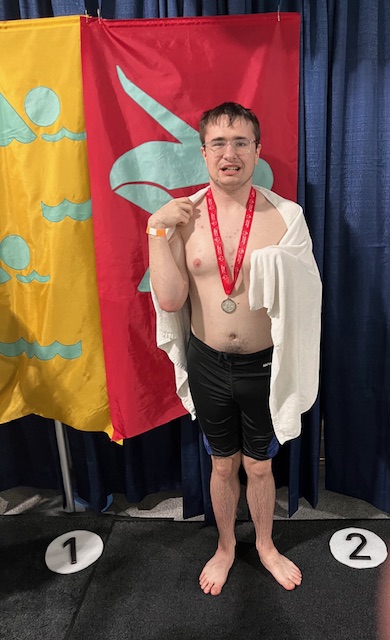This morning, I stood at the edge of a small indoor pool at the Special Olympics Regional Swim Meet, watching Stone get ready for his events.
And I felt it.
That unmistakable, overwhelming feeling I’ve come to recognize at these gatherings.
It’s not just pride.
It’s not just joy.
It’s what the world is supposed to feel like.

Everywhere I looked, I saw support.
Volunteers cheering their hearts out.
Parents smiling with tears in their eyes.
Athletes of all abilities moving through the world exactly as they are—
with no need to apologize, mask, or meet someone else’s expectations.
And it hit me:
If Special Olympics parents could rule the world, we’d all be better off.
We’d Measure Success Differently
We wouldn’t be obsessed with status, resumes, or outcomes.
Success would look like a kid who used to fear the water stepping into the pool.
Like a teen raising their arms in celebration after completing 15 meters—on their own terms.
Like Stone—
returning three years after his last meet, more confident, more grounded, more himself than ever.
Proactively telling every passerby, “Happy! Happy!”
High-fiving them—making sure his joy was both understood and shared.
That kind of progress—the real kind—would be valued more than perfection.
Empathy Would Be Policy
Special Olympics parents don’t show up thinking about convenience.
We show up because we’ve had to fight for everything—
for communication, for safety, for accommodations, for dignity.
If we ran things?
Empathy wouldn’t be a line in a brochure.
It would be baked into everything.
The decisions.
The design.
The dialogue.
Because we know what it’s like to be dismissed—
and we’d never let that happen to someone else.
We’d Slow Down… and Get Stronger
You learn pretty quickly as a Special Olympics parent that rushing doesn’t help.
You learn to celebrate small steps.
To pause for joy.
To notice the wins the world often misses.
We’d create a society that breathes deeper.
One that gives people time to grow into who they’re becoming—
without shame, without comparison, without deadlines that crush the soul.
Accommodation Would Be Love in Action
No one would say,
“Well, that’s not fair to the rest of the class.”
Or, “We don’t usually allow that.”
Or, “He doesn’t look disabled.”
Instead, we’d ask:
“What do you need—and how can we help?”
Because we’ve been the ones writing the emails,
chasing the teams,
pleading for tools and strategies that make the world even marginally more accessible.
And we’ve learned:
Adaptation isn’t weakness.
It’s compassion made visible.
Love Would Be Louder
Louder than policy.
Louder than shame.
Louder than the silence that surrounds so many families when they’re struggling alone.
At Special Olympics events, love echoes in every corner.
It shows up in how we cheer for each other’s kids.
In how we beam at strangers’ milestones.
In how we just get it—without needing to explain a thing.
It’s a kind of love that stays.
That sees.
That never gives up.
That knows exactly how much work it takes sometimes just to make it to the starting line.
Today, I watched Stone do something extraordinary.
Not because he broke a record or stood on a podium.
But because he showed up with everything he is.
And the world around him said:
Yes. You belong here.
That’s the world I want.
The world I fight for.
The one I believe is possible.
And maybe—just maybe—
if Special Olympics parents could rule the world,
that’s exactly the one we’d create.
